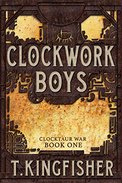
| Series: | The Clocktaur War #1 |
| Publisher: | Red Wombat Tea Company |
| Copyright: | 2017 |
| ASIN: | B0783P29QP |
| Format: | Kindle |
| Pages: | 230 |
This is an ebook, so metadata may be inaccurate or missing. See notes on ebooks for more information.
Clockwork Boys starts with Slate picking a man out of the Dowager's prisons to the overpowering smell of rosemary. It's an uncomfortable situation for everyone: the warden, the prisoners, and Slate herself, although on the positive side she'll probably be dead soon and then it won't matter. That said, she was not expecting to find the infamous Lord Caliban, who murdered eight nuns (okay, technically three nuns and five novices) while possessed. He's either exactly the person she was looking for or a total disaster she should stay as far away from as possible.
Slate is a forger. Caliban is the third member of an improbable crew, joining her and Brenner, an assassin. With the scholar-priest who joins them later, their goal is to cross battle lines, infiltrate an enemy city, and discover how their enemy is making nearly-indefeatable mechanical soldiers. It's a suicide mission, of course, which is why the Dowager is sending convicted criminals and adding the incentive of carnivorous tattoos.
If this sounds like a D&D party, that's not an accident. This is the first half of Ursula Vernon's paladin rant in story form (T. Kingfisher is the pseudonym she uses for books for adults), which she has mentioned and given partially on Twitter. However, Clockwork Boys is mostly setup, introductions, and a few road adventures to flesh out the dynamics of the group. You (and I) will have to wait until the second book for (presumably) the meat of the rant.
What we get in the meantime is a protagonist who can detect danger and significance through the supernatural scent of rosemary. Since this is an Ursula Vernon novel, that means Slate goes into danger sneezing uncontrollably, with her eyes watering so much she can't see. Magical premonitions have no sense of proportion. You can tell the paladin is a paladin because he always has a spare handkerchief.
I thought the best part of this book was that Slate and Brenner (who already knew each other) go into this adventure with a far more mature and competent attitude than Caliban or, later, the scholar Edmund. The latter two have great difficulty understanding Slate's attitude, her decisions, or her role in the party. However, and this is the very critical point, none of Brenner, Slate, or the narrator consider it particularly important to argue with them about their misconceptions. This book is full of Caliban making some stupid assumption about Slate and Slate then doing exactly what she was going to do in the first place without caring one whit about Caliban's assumption. It's absolutely glorious.
Clockwork Boys is somewhat driven by Caliban and his past and his emotional reactions to losing his connection with his god (not to mention being possessed and being kicked out of his order). It is part of the paladin rant, after all. But much of the focus is on Slate, which I approve of because Slate is the most interesting character in this book. She's cynical, sarcastic, and certain this expedition is doomed, but she's never done something incompetently in her life and isn't about to start now. Also, full points for a book about people who know how to talk to other people and how to stop conversations they don't want to have without having random angst explosions.
And the banter is wonderful.
This is only the first half of what's really a long novel, so it's worth withholding some judgment before seeing the second half. But it's a great Ursula Vernon take on D&D-inspired fantasy, I thoroughly enjoyed it, and am looking forward to the other half of the story.
Followed by The Wonder Engine.
Reviewed: 2018-12-29